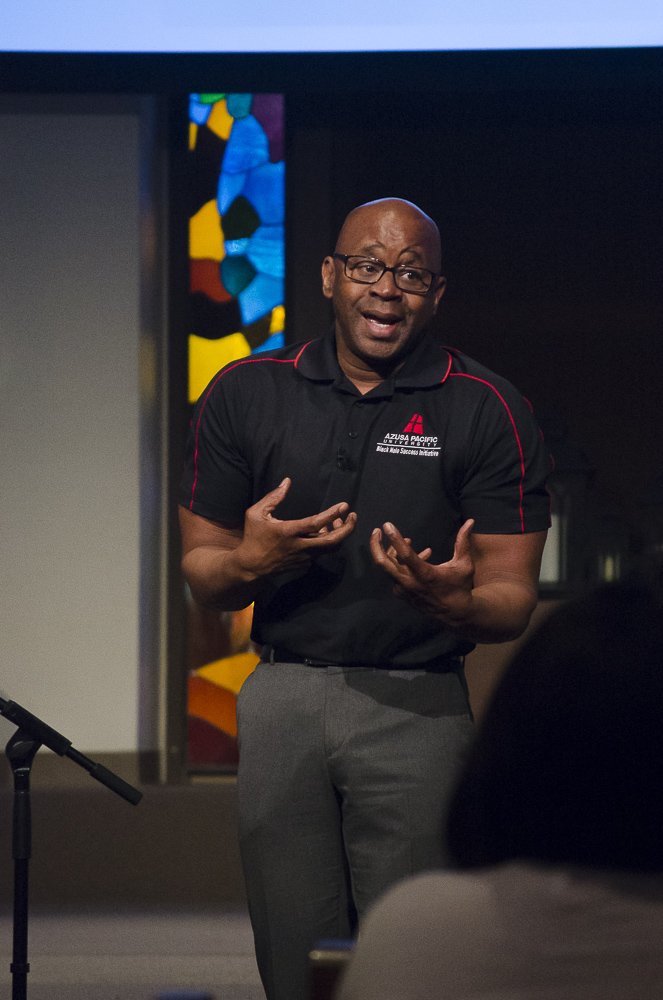As Biola’s demographics reveal an increase in diversity since 2008, the need for racial reconciliation is essential on campus now more than ever.
At the Student Congress on Racial Reconciliation, students had the opportunity to learn more about diverse perspectives through such mediums as poetry, spoken word, music and drama. These were effective in engaging students in different ways to consider the need for and process of racial reconciliation.
Prompted by an increase of racial tension
Biola’s Multi-Ethnic Programs and Development hosted the 20th Annual SCORR two-day conference on Feb. 19 to 20 with visitors from various Christian colleges and universities across the country coming to learn about and celebrate the diversity within the body of Christ.
MEPD’s and SCORR’s director, Glen Kinoshita, said this year’s theme, “Do justice, love mercy and walk humbly” from Micah 6:8, was prompted by an increase of racial tension and student protest across the country.
Reasons vary from student to student as to why they attended SCORR from wanting to complete a requirement to actual interest.
“In the news there’s been a lot of interesting stuff going on with black lives matter. It’s brought topics of racial reconciliation to mind a lot more. I wanted to expose myself to those conversations,” said Daniel Chrosniak, junior philosophy major.
Students from other universities came to better learn about racial conciliation.
“I’m in a leadership position at my school and I work with international students. I wanted to work with students and be able to give them my all,” said Sam Cuyuch, freshman political science major from Fresno Pacific University.
Response to Racial unrest
Kinoshita wanted to use the SCORR conference as a biblical response to the racial unrest around the country.
“There’s a lot of racial tension and unrest in our country on many different aspects and in many different contexts. We’ve seen a proliferation of campus protests. Students [are] demanding increased efforts on diversity. We felt that it was time to address this from a biblical standpoint,” Kinoshita said.
The conference had workshops run by presenters from numerous Christian colleges and churches, addressing topics such as student leadership across cultures, understanding national campus protests and the role of white evangelicals.
Artistic expression
Other presentations used various art forms like the poetry lounge, where people performed spoken word, and President Barry Corey participated
“I wrote this poem for Biola students. In many ways I wrote this inspired by Glen and I dedicate it to him,” Corey said before reading the poem to his audience in the Sutherland auditorium.
Other spoken word artists were NomiS and Danielle Bennett in addition to Biola students and alumni.
“We have a very strong commitment to the arts. We engage diversity through the arts in a very effective way. Art is a very crucial component of our education as well,” Kinoshita said.
Other performances included Taiko drummers and a drama presentation by Will and Company titled “Fifty Years On — Latinos Shaping a Nation.”
Keynote sessions were presented by Lisa Sharon Harper, chief church engagement officer of Sojourner, a faith-based justice agency.
“We need to repent of the ways that our systems and our policies are cursing the image of God. And we need to change those systems through repentance to bless the image of God among us,” Harper said.
Provoking a response from the body of Christ
Considering news outlets have broadcasted unrests, such as Ferguson, headlining injustice treatment of races within the United States, Harper identifies the message as a racial split and how that in turn it should provoke a response from the body of Christ.
“It’s not racial reconciliation that’s becoming clarified, it’s the reality of racial divisions and racial injustice that’s becoming very clear. The question that we really have to ask ourselves as the church is ‘How will we engage in the reformation of our world into a more just world?’” Harper said.
The learning of diversity and the ability to apply it is of great need and is one of the objectives of the SCORR conference.
“It’s a very sobering time because we’re looking at the state of Christian colleges and what’s happening in our country. The need to address this conversation as well as to engage in action is as great as ever,” Kinoshita said.







